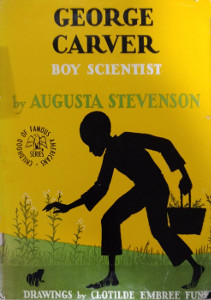George Carver: Boy Scientist

Author:
Augusta Stevenson
Illustrator:
Clotilde Embree Funk
Publication:
1944 by Bobbs-Merrill Company
Genre:
Biography, Non-fiction
Series:
Childhood of Famous Americans (Scientists and Inventors)
Series Number: 24
Pages:
202
Current state:
This book has been evaluated and information added. It has not been read and content considerations may not be complete.
Book Guide
Search for this book used on:
The year was 1861, and the place Moses Carver's farm at Diamond Grove, Missouri. A band of Night Riders stole the young slave woman Mary and her sick baby. Moses Carver sent a man all the way to Arkansas to look for Mary and her little boy. In a week the man was back — with George. The thieves had had no use for a sick baby and had given him to some woman. Mary had disappeared—no one knew where.
Mrs. Carver was good to the frail boy, though as he grew up she had to scold him for bringing queer things into the house. One day when she made him empty his pockets she counted two frogs, six beetles, four caterpillars, one granddaddy longlegs, two big tobacco worms and one snake! Another time a lizard got away indoors. George was always picking pretty weeds or seed pods. When he complained that something had bitten him in the night, Mrs. Carver examined his bed. George had taken a thistle to bed with him! That fall he gathered stalks of milkweed and brought them into the kitchen intending to use the fluff. On the very day Mrs. Carver chose to make jelly, the pods burst and the milkweed fluff floated down into every pot and jar.
George had a secret garden where he experimented with the flowers he loved. Some he planted in clay, some in sand and some in loam. When he found that petunias did not grow well in rich soil, he reasoned they were like people who get sick if they eat too much cake. So successful was he at growing things that neighbors called him "the plant doctor" and brought him their plants to cure. For a time Mr. and Mrs. Carver taught George at home, and he learned his ABC's from an old blue-backed speller. When he was old enough to go away to school, misfortune came suddenly to the farm, and Moses Carver had no money to send the boy. That didn't stop George!
He set out alone. To earn money during the hours he was not in class, he washed clothes, did fancy ironing, cooked, performed all manner of odd jobs. And despite all this hard work, the frail boy won prizes for high grades in school.
Years later, the Congress of the United States in Washington, D.C., paid homage to George Washington Carver, the great Negro scientist, who was now a professor at the Tuskegee Institute. When the Congressmet saw his exhibit of 300 things he had made from peanuts, 118 products from sweet potatoes, and knew that he had refused personal wealth, they knew too that George Carver was a man with a great heart and a great soul — a man who would make any sacrifice to help mankind.
From the dust jacket
To view an example page please sign in.


